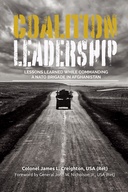Explore

Colonel Creighton’s command provides an excellent case study in the leadership of coalitions, which are critical to the United States now and in the future. The U.S. military’s mission in Afghanistan enjoyed significant legitimacy because it operated within a coalition that was based on international mandates from the United Nations and the North Atlantic Treaty Organization (NATO). These mandates enabled unity of purpose among the more than 50 nations that joined the Coalition and sustained that unity for more than 20 years. Coalitions enable the sharing of burdens among troops, funding, equipment, and civil, humanitarian, and development support. When legitimacy is firmly established, political leaders can more easily generate domestic support and secure precious resources. Coalition members contribute within their unique capabilities, and as a result, the whole becomes greater than the sum of the parts. The unity enabled by legitimacy creates political and military options that are not possible when nations act unilaterally. Ultimately, this unity among the United States and its allies and partners will be essential to prevail in the strategic competition vis-à-vis China and Russia.
This book is included in DOAB.
Why read this book? Have your say.
You must be logged in to comment.
Rights Information
Are you the author or publisher of this work? If so, you can claim it as yours by registering as an Unglue.it rights holder.Downloads
This work has been downloaded 23 times via unglue.it ebook links.
- 23 - pdf (CC BY-NC-ND) at Unglue.it.
Keywords
- Land forces and warfare
- Society & Social Sciences
- War & defence operations
- War and defence operations
- Warfare & Defence
Links
DOI: 10.56686/9798986259505Editions

